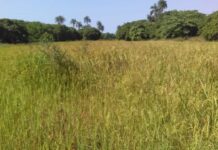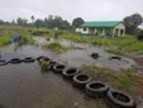By Mariama Marong
Tujereng women gardeners have recently called on the government to remedy their devastating situation that occurred due to the July 2022 flooding that affected their garden produce. Gardening activities at Tujereng are at a stand still due to the devastating effect of flooding that damaged vegetables and seeds and destroyed crop yields.
The flooding has left more than one hundred and thirty women unproductive in their gardening activities, which led to loss of income in the community.
Speaking to Foroyaa, Aja Majai Sonko, the acting president of Tujereng Women’s Garden, said since the founding of the garden in the 1980s, this is the first time they experience such a magnitude of calamity. She said more than one hundred and thirty women are engaged in gardening to make ends meet.
“These women are now all staying at home doing nothing because nobody dares to go to the garden at this moment as it is badly affected by the heavy downpour and destroying all our crops, vegetables, and even seeds,” she said.
Madam Sonko said the garden is about two hectares, serving almost all the women who want to engage in gardening at the village.
“We have spent a huge amount of money on the garden in order to ensure that our produce grows well. So when it is time to benefit from our money this (flood) happened,” she explained. She called on the government through its line ministry to find a solution by providing pumping machines which will evacuate the water from the garden.
Borry Njie, a gardener, lamented that it is disheartening and sad for all the
women involved in gardening at Tujereng Women’s Garden. She added that it is a difficult situation for them to bear because all their hard work has gone in vain.
“Our garden is full of stagnant water and the water has nowhere to go. It has destroyed all our vegetables and crops. We work in the garden to take care of our family and children’s school fees. Now, all that has been affected,” she said.
Njie urged the Barrow administration to consider rural women and find a lasting solution to their problems.
Binta Saidy, also a gardener at Tujereng Women’s Garden, narrated that she has lost all her produce.
“I am an elderly citizen who does not want to be left at home because going and coming to the garden add more strength to my wellbeing,” she said. She added that it is through gardening that she supports her family and grandchildren.
“Now I am thinking of how to sustain my family and school going children when schools open,” she said. Saidy also called on whoever is responsible to help them evacuate the water from the garden.
For his part, Mr. Lamin A. Sonko, community developer and youth representative at Tujereng Women’s Garden, said the situation of the garden is a mess which needs immediate solution.
Currently, he said there is no gardening activity taking place, which he said can cause a serious setback to the women and the community at large.
“This year’s rainy season has affected people at Tujereng badly that even houses are affected and the flooding has devastated the gardening community a lot, because the soil in the garden does not support, and this is the first time we are experiencing such type of clay soil in our garden,” he said.
Mr. Sonko noted that the current situation is a total setback in the development of the community. He said the Brikama Area Council is aware of their situation because the Village Development Committee (VDC) was informed about the matter. He however said that nothing has been done yet to address the situation.
Sonko said the community needs a lasting solution to avoid recurrence in future; that if nothing is done to help the women, they may lose the garden forever, owing to the soil type discovered recently.
He urged the government to be proactive in dealing with situations like disasters that affect people’s lives and livelihoods.
“What our women need currently is a pumping machine to extract the water as soon as possible. These women are our sisters, aunties, mothers and grandmothers and the vegetables they produce are for the greater good,” he said.



















